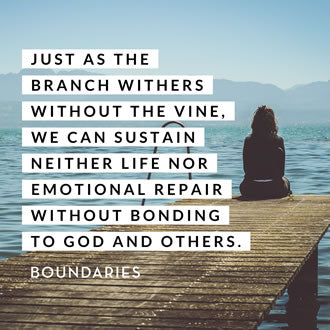
Sarah had been working on major boundaries issues in her therapy for a while now. She was seeing progress in resolving responsibility conflicts with her parents, her husband, and her kids. Yet today she introduced a new issue.
"I haven't told you about this relationship before, though I guess I should have. I have tremendous boundary problems with this woman. She eats too much, and has an attacking tongue. She's undependable — lets me down all the time. And she's spent money of mine and hasn't paid me back in years."
"Why haven't you mentioned her before?" I asked.
"Because she's me," Sarah replied.
Sarah was echoing the conflict most of us have. We learn that boundaries are biblical. We begin setting limits on others. We begin moving from taking too much responsibility to taking just enough. But how do we begin to set limits on ourselves?
Instead of looking at the control and manipulation of others, we also need to be looking at our responsibility to control our internal boundary conflicts. This can get a little touchy. But, instead of a defensive posture, we are much better off to look humbly at ourselves. To ask for feedback from others. To listen to people we trust. And to confess, "I was wrong."
Since the Fall, our instincts have been to withdraw from relationship when we're in trouble, when we most need other people. (Remember how Adam and Eve hid from God after they ate the forbidden fruit?) Due to our lack of security, our loss of grace, our shame, and our pride, we turn inward, rather than outward, when we're in trouble. And that's a problem. As Ecclesiastes 4:10 puts it, "Woe to one who is alone and falls and does not have another to help."
Such withdrawal happens in our program time after time. For the first time, hurting people come forth with their need for connection. Like a rose lifting its petals after a hard rain, they begin to relate and connect in the light of the grace of God and his people. Then an unexpected setback will occur. Instead of bringing the painful and frightening feelings and problems to their newfound relationships, these people will often retreat to work out the problem alone.
It is only when this attempt at a solution breaks down that they finally realize that these spiritual pains and burdens need to be brought out of themselves to the body of Christ. Truly every person needs to feel very secure before she will risk taking her spiritual and emotional problems to other people.
And yet the Bible doesn't recognize any other answer to our problems. Grace must come from the outside of ourselves to be useful and healing. Just as the branch withers without the vine (John 15:1–6), we can sustain neither life nor emotional repair without bonding to God and others. God and his people are the fuel, the energy source from which any problem is addressed. We need to be “joined and held together by every supporting ligament” (Eph. 4:16) of the body of Christ to heal and to grow up.
Whether our boundaries issue is food, substances, sex, time, projects, the tongue, or money, we can't solve it in a vacuum. If we could, we would. But the more we isolate ourselves, the harder our struggle becomes. Just like an untreated cancer can become life-threatening in a short time, self-boundary problems will worsen with increased aloneness.
Ready to go deeper on this topic? Discover how to set healthy limits in any situation in The New York Times bestselling book, Boundaries.
➡️ Get The 10 Laws of Boundaries eBook when you subscribe to the Boundaries Weekly email newsletter. Learn More
